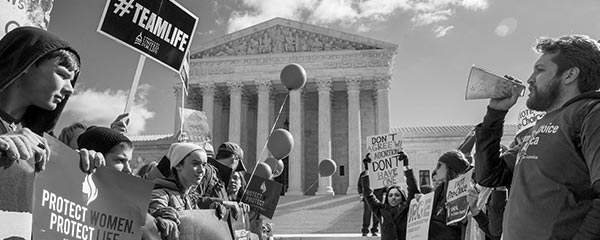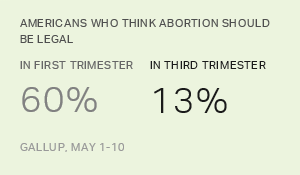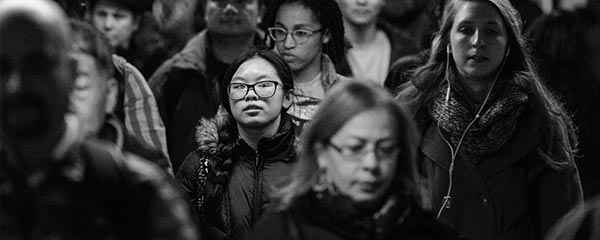Story Highlights
- Nearly six in 10 Americans not content with nation's abortion laws
- The dissatisfied are split between wanting stricter vs. less strict laws
WASHINGTON, D.C. -- Fifty-eight percent of Americans say they are dissatisfied with the nation's policies on abortion, marking a seven-percentage-point increase from one year ago and a new high in Gallup's trend. On the flip side, 32% are now satisfied, a new low.
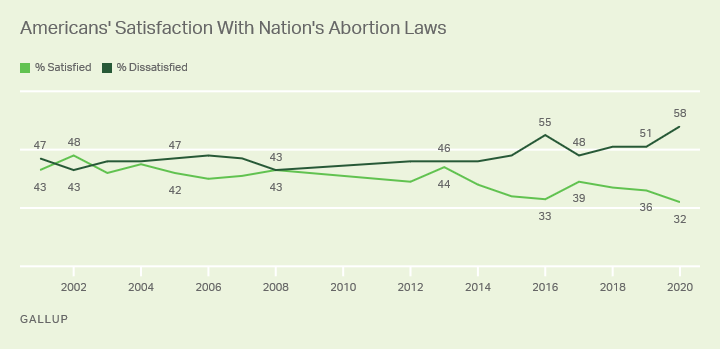
Gallup has measured Americans' satisfaction with the country's abortion policies most years since 2001 as part of its annual Mood of the Nation poll. The latest results are from a Jan. 2-15, 2020, survey.
Those who are dissatisfied with the country's abortion policies are then asked how they would prefer abortion laws to be changed. Historically, most of this dissatisfied group wanted abortion laws to be stricter; relatively few wanted them less strict. On average from 2001 to 2017, about a quarter of U.S. adults were dissatisfied with abortion laws and wanted them to be stricter.
However, since then, the percentage wanting the laws to be less strict has increased to the point that roughly equal percentages of U.S. adults now are dissatisfied and favor less strict laws (22%) as are dissatisfied and want stricter laws (24%).
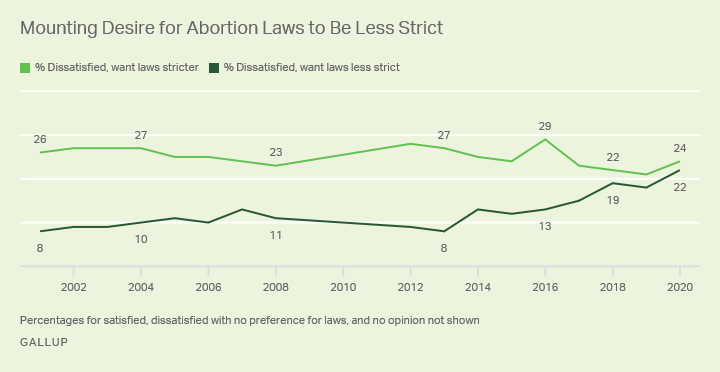
Gallup trends show that the rise in Americans' desire for loosening the nation's abortion laws is driven by more Democrats and independents holding this view over the past decade. Republicans' views have been fairly steady, with relatively few wanting the laws to become less strict.
From 2001 through 2016 -- spanning the presidencies of George W. Bush and Barack Obama -- roughly equal proportions of Democrats favored stiffening versus loosening abortion laws. However, since Donald Trump took office in 2017, Democrats have been less satisfied with the nation's abortion policies and significantly more likely to say the laws should be less strict.
Over the same period, independents went from leaning in favor of stricter laws to equal portions espousing each side of the issue. Republicans have remained solidly in the "more strict" camp across all three presidencies.
| Satisfied | Dissatisfied, want more strict | Dissatisfied, want less strict | Net "want more strict" | |||||||||||||||||||||||||||||||||||||||||||||||||||||||||||||||||||||||||||||||||||||||||||||||||
|---|---|---|---|---|---|---|---|---|---|---|---|---|---|---|---|---|---|---|---|---|---|---|---|---|---|---|---|---|---|---|---|---|---|---|---|---|---|---|---|---|---|---|---|---|---|---|---|---|---|---|---|---|---|---|---|---|---|---|---|---|---|---|---|---|---|---|---|---|---|---|---|---|---|---|---|---|---|---|---|---|---|---|---|---|---|---|---|---|---|---|---|---|---|---|---|---|---|---|---|---|
| % | % | % | pct. pts. | |||||||||||||||||||||||||||||||||||||||||||||||||||||||||||||||||||||||||||||||||||||||||||||||||
| Republicans | ||||||||||||||||||||||||||||||||||||||||||||||||||||||||||||||||||||||||||||||||||||||||||||||||||||
| 2017-2020 (Trump) | 32 | 44 | 5 | +38 | ||||||||||||||||||||||||||||||||||||||||||||||||||||||||||||||||||||||||||||||||||||||||||||||||
| 2009-2016 (Obama) | 27 | 43 | 7 | +36 | ||||||||||||||||||||||||||||||||||||||||||||||||||||||||||||||||||||||||||||||||||||||||||||||||
| 2001-2008 (Bush) | 41 | 38 | 5 | +33 | ||||||||||||||||||||||||||||||||||||||||||||||||||||||||||||||||||||||||||||||||||||||||||||||||
| Independents | ||||||||||||||||||||||||||||||||||||||||||||||||||||||||||||||||||||||||||||||||||||||||||||||||||||
| 2017-2020 (Trump) | 36 | 20 | 18 | +2 | ||||||||||||||||||||||||||||||||||||||||||||||||||||||||||||||||||||||||||||||||||||||||||||||||
| 2009-2016 (Obama) | 38 | 26 | 10 | +16 | ||||||||||||||||||||||||||||||||||||||||||||||||||||||||||||||||||||||||||||||||||||||||||||||||
| 2001-2008 (Bush) | 42 | 23 | 11 | +12 | ||||||||||||||||||||||||||||||||||||||||||||||||||||||||||||||||||||||||||||||||||||||||||||||||
| Democrats | ||||||||||||||||||||||||||||||||||||||||||||||||||||||||||||||||||||||||||||||||||||||||||||||||||||
| 2017-2020 (Trump) | 40 | 8 | 31 | -23 | ||||||||||||||||||||||||||||||||||||||||||||||||||||||||||||||||||||||||||||||||||||||||||||||||
| 2009-2016 (Obama) | 46 | 13 | 16 | -3 | ||||||||||||||||||||||||||||||||||||||||||||||||||||||||||||||||||||||||||||||||||||||||||||||||
| 2001-2008 (Bush) | 47 | 16 | 14 | +2 | ||||||||||||||||||||||||||||||||||||||||||||||||||||||||||||||||||||||||||||||||||||||||||||||||
| Table excludes percentages for dissatisfied with no preference for laws and no opinion | ||||||||||||||||||||||||||||||||||||||||||||||||||||||||||||||||||||||||||||||||||||||||||||||||||||
| Gallup | ||||||||||||||||||||||||||||||||||||||||||||||||||||||||||||||||||||||||||||||||||||||||||||||||||||
Other Subgroup Differences Also Apparent on Abortion Views
In addition to Republicans, Protestants, adults with no college education, and Americans aged 55 and older are substantially more likely to favor making the laws on abortion more rather than less strict. Men and non-Hispanic whites as a whole also lean this way.
Along with Democrats, nonreligious Americans and adults younger than 35 are much more in favor of making the laws less strict than making them stricter. Nonwhites and adults with postgraduate education are slightly more in favor of the laws being less strict.
| Satisfied | Dissatisfied, want more strict | Dissatisfied, want less strict | Net "want more strict" | |||||||||||||||||||||||||||||||||||||||||||||||||||||||||||||||||||||||||||||||||||||||||||||||||
|---|---|---|---|---|---|---|---|---|---|---|---|---|---|---|---|---|---|---|---|---|---|---|---|---|---|---|---|---|---|---|---|---|---|---|---|---|---|---|---|---|---|---|---|---|---|---|---|---|---|---|---|---|---|---|---|---|---|---|---|---|---|---|---|---|---|---|---|---|---|---|---|---|---|---|---|---|---|---|---|---|---|---|---|---|---|---|---|---|---|---|---|---|---|---|---|---|---|---|---|---|
| % | % | % | pct. pts. | |||||||||||||||||||||||||||||||||||||||||||||||||||||||||||||||||||||||||||||||||||||||||||||||||
| U.S. adults | 32 | 24 | 22 | +2 | ||||||||||||||||||||||||||||||||||||||||||||||||||||||||||||||||||||||||||||||||||||||||||||||||
| Gender | ||||||||||||||||||||||||||||||||||||||||||||||||||||||||||||||||||||||||||||||||||||||||||||||||||||
| Men | 31 | 27 | 19 | +8 | ||||||||||||||||||||||||||||||||||||||||||||||||||||||||||||||||||||||||||||||||||||||||||||||||
| Women | 33 | 22 | 25 | -3 | ||||||||||||||||||||||||||||||||||||||||||||||||||||||||||||||||||||||||||||||||||||||||||||||||
| Age | ||||||||||||||||||||||||||||||||||||||||||||||||||||||||||||||||||||||||||||||||||||||||||||||||||||
| 18-34 | 33 | 19 | 35 | -16 | ||||||||||||||||||||||||||||||||||||||||||||||||||||||||||||||||||||||||||||||||||||||||||||||||
| 35-54 | 31 | 23 | 20 | +3 | ||||||||||||||||||||||||||||||||||||||||||||||||||||||||||||||||||||||||||||||||||||||||||||||||
| 55+ | 32 | 30 | 15 | +15 | ||||||||||||||||||||||||||||||||||||||||||||||||||||||||||||||||||||||||||||||||||||||||||||||||
| Race/Ethnicity | ||||||||||||||||||||||||||||||||||||||||||||||||||||||||||||||||||||||||||||||||||||||||||||||||||||
| Non-Hispanic white | 31 | 27 | 19 | +8 | ||||||||||||||||||||||||||||||||||||||||||||||||||||||||||||||||||||||||||||||||||||||||||||||||
| Nonwhite | 33 | 20 | 29 | -9 | ||||||||||||||||||||||||||||||||||||||||||||||||||||||||||||||||||||||||||||||||||||||||||||||||
| Education | ||||||||||||||||||||||||||||||||||||||||||||||||||||||||||||||||||||||||||||||||||||||||||||||||||||
| Postgraduate | 39 | 16 | 25 | -9 | ||||||||||||||||||||||||||||||||||||||||||||||||||||||||||||||||||||||||||||||||||||||||||||||||
| College graduate only | 34 | 23 | 26 | -3 | ||||||||||||||||||||||||||||||||||||||||||||||||||||||||||||||||||||||||||||||||||||||||||||||||
| Some college | 31 | 24 | 24 | 0 | ||||||||||||||||||||||||||||||||||||||||||||||||||||||||||||||||||||||||||||||||||||||||||||||||
| No college | 30 | 29 | 18 | +11 | ||||||||||||||||||||||||||||||||||||||||||||||||||||||||||||||||||||||||||||||||||||||||||||||||
| Party ID | ||||||||||||||||||||||||||||||||||||||||||||||||||||||||||||||||||||||||||||||||||||||||||||||||||||
| Republican | 33 | 42 | 6 | +36 | ||||||||||||||||||||||||||||||||||||||||||||||||||||||||||||||||||||||||||||||||||||||||||||||||
| Independent | 31 | 24 | 22 | +2 | ||||||||||||||||||||||||||||||||||||||||||||||||||||||||||||||||||||||||||||||||||||||||||||||||
| Democratic | 32 | 7 | 40 | -33 | ||||||||||||||||||||||||||||||||||||||||||||||||||||||||||||||||||||||||||||||||||||||||||||||||
| Religious preference | ||||||||||||||||||||||||||||||||||||||||||||||||||||||||||||||||||||||||||||||||||||||||||||||||||||
| Protestant/Christian | 33 | 31 | 14 | +17 | ||||||||||||||||||||||||||||||||||||||||||||||||||||||||||||||||||||||||||||||||||||||||||||||||
| Catholic | 33 | 25 | 17 | +8 | ||||||||||||||||||||||||||||||||||||||||||||||||||||||||||||||||||||||||||||||||||||||||||||||||
| None/Atheist/Agnostic | 34 | 11 | 38 | -27 | ||||||||||||||||||||||||||||||||||||||||||||||||||||||||||||||||||||||||||||||||||||||||||||||||
| Table excludes percentages for dissatisfied with no preference for laws and no opinion | ||||||||||||||||||||||||||||||||||||||||||||||||||||||||||||||||||||||||||||||||||||||||||||||||||||
| Gallup, Jan. 2-15, 2020 | ||||||||||||||||||||||||||||||||||||||||||||||||||||||||||||||||||||||||||||||||||||||||||||||||||||
Bottom Line
Americans have grown increasingly dissatisfied with the nation's abortion policies since 2017, largely reflecting Democrats' -- and to a lesser extent, independents' -- mounting view under Trump that the laws are too strict. While this may partly be a reaction to Trump's rhetoric on the issue, it also aligns with an increase in abortion restrictions. In 2017 alone, 63 new abortion restrictions were adopted at the state level in what the Guttmacher Institute describes as "the largest number of abortion restrictions enacted in a year since 2013."
Democrats' heightened alarm about reproductive rights may help their party in the 2020 election if Democrats are more motivated than usual to vote on the issue, or if the issue influences more independents than usual to support the Democratic candidate. Gallup's December measure of the electoral importance of various issues to Americans found Republicans and Democrats about equally likely to rate the abortion issue as "extremely important" to their vote. However, this could change after the primaries when the Democratic nominee and Trump are able to debate the issue directly.
View complete question responses and trends.
Learn more about how the Gallup Poll Social Series works.

